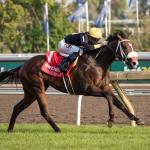
Noel’s Weekend Winners: Action Heats Up Saturday in Hot Springs

Man o’ War is widely considered to be the greatest racehorse in North American history. The chestnut colt was named in honor of his owner, who shortly after the horse was born enlisted to fight in France in World War I … at the age of 65!
Man o’ War was the odds-on favorite in every race he ever ran, and he delivered for his many backers time and time again, winning each of his races, almost always in dramatic, front-running fashion. Each of them save for one, that is.
Man o’ War finished his two-year career with a record of 20 wins and one second-place finish in 21 races. That lone loss came in 1919 in the Sanford Memorial at Saratoga, to a horse so aptly named Upset.
Over the years, a legend grew almost as large as the story of Man o’ War’s impressive record and talent — the legend of the phrase “upset victory” in sports. The story often told is that “upset victory” traces back to that fateful day in Saratoga Springs, N.Y., when Upset bested the super-horse and served Man o’ War his only defeat. You can find references to this bit of trivia everywhere in the past hundred years, even as recently as last year. Here’s The Saratogian last year on the occasion of Man o’ War’s 100th birthday:
And, much of Man o’ War’s history took place right in our territory. He was purchased, for the bargain price of $5,000 at Saratoga’s yearling sales in 1918. He raced here five times.
And, of course, it was at Saratoga where he suffered one of the greatest upsets in the history of the sport.
In fact, his loss resulted in a new description for a shocking defeat of a heavy favorite.
The word “upset” became part of our sporting lexicon when a colt of that name was the surprise winner of the 1919 Stanford Stakes, a race for 2-year olds.
Or here’s a reference to it on Secretariat’s website:
It was at Saratoga, in 1919, that the word “upset” entered the American sports lexicon. That’s when a horse named Upset beat the mighty Man o’ War. It was the original Big Red’s only defeat. In those days, the word upset had a more literal meaning, along the lines of tip over, or capsize. But it had no particular connection with sports. Then came Upset’s victory over the seemingly invincible Man o’ War. So shocking was Upset’s triumph over Man o’ War, that sports scribes began to describe unexpected outcomes in other sports like football and basketball by saying so-and-so “pulled off an Upset.” Eventually, the capitalized “U” in Upset became lower case as upset became a part of regular usage, and a word we know well today.
But is it true? Years ago in the Los Angeles Times, writer Brian Cronin made the case that “upset victory” being derived from Upset’s victory is a myth. He cites as his evidence a librarian and well-known word sleuth at NYU’s Bobst Library named George Thompson. In an online discussion among linguists about “upset victory,” Thompson researched the news accounts after Upset defeated Man o’ War looking for any indication that writers were aware of the coincidence of this horse’s name and the fact that he defeated a heavy favorite, thus proving the usage of the term in sports predated the race. He summed up his findings:
It seemed to me then to be significant that none of the reports said anything like "Upset lived up to his name yesterday." I concluded, "These accounts of the race suggest that the word ‘upset’ was not familiar in the sense of ‘unexpected victory or loss’ before this event. The World stated: ‘One might make all sorts of puns about it being an upset, but Man o’ War in the opinion of nine out of 10 observers was far the better colt in the race … (August 14, 1919, p. 11, col. 1). The pun did not occur to the reporters from the Tribune or the Times. It occurred to the reporter for The Sun also: ‘Upset’s victory was a big upset to all racegoers, even his famous trainer, James Rowe.’ ”
He also found multiple uses of the word “upset” as a noun in articles about horse racing throughout the late 19th Century. It wasn’t unusual to use the word “upset” to mean something that defied expectations.

I myself fell victim to this skepticism in these very pages years ago. However, on the occasion of Man o’ War’s 101st birthday, I’m now willing to split the baby on this particular mystery.
When I search newspaper databases for the term “upset victory,” it is impossible to find any usage of that particular phrase anywhere before 1920. It enters the lexicon slowly in the years after Man o’ War’s loss. Then, in the early 1950s, it spikes upward.
There probably are good explanations for this. For one thing, the full gravity of Upset’s victory over Man o’ War wouldn’t have been clear until after Man o’ War’s retirement. Only then would people realize that Upset had been his only loss. And, a spike in the early 1950s coincides with a spike in the popularity of horse racing. In 1950, horse racing was at its peak and topped all other sports in attendance. This would logically also lead to a spike in reporting on horse racing in sports pages, where the usage of a racing-inspired term might spread to other sports.
It’s fine to be a skeptic, but when you consider how many other popular American idioms derive from the world of horse racing (across the board, dead heat, hands down, etc), it’s easy to imagine that this particular one comes from racing as well.